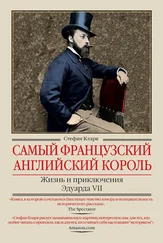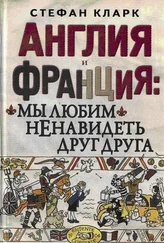Стефан Кларк - 1000 Years of Annoying the French
Здесь есть возможность читать онлайн «Стефан Кларк - 1000 Years of Annoying the French» весь текст электронной книги совершенно бесплатно (целиком полную версию без сокращений). В некоторых случаях можно слушать аудио, скачать через торрент в формате fb2 и присутствует краткое содержание. ISBN: , Издательство: Transworld Digital, Жанр: Старинная литература, на английском языке. Описание произведения, (предисловие) а так же отзывы посетителей доступны на портале библиотеки ЛибКат.
- Название:1000 Years of Annoying the French
- Автор:
- Издательство:Transworld Digital
- Жанр:
- Год:неизвестен
- ISBN:9781407067629
- Рейтинг книги:3 / 5. Голосов: 1
-
Избранное:Добавить в избранное
- Отзывы:
-
Ваша оценка:
- 60
- 1
- 2
- 3
- 4
- 5
1000 Years of Annoying the French: краткое содержание, описание и аннотация
Предлагаем к чтению аннотацию, описание, краткое содержание или предисловие (зависит от того, что написал сам автор книги «1000 Years of Annoying the French»). Если вы не нашли необходимую информацию о книге — напишите в комментариях, мы постараемся отыскать её.
1000 Years of Annoying the French — читать онлайн бесплатно полную книгу (весь текст) целиком
Ниже представлен текст книги, разбитый по страницам. Система сохранения места последней прочитанной страницы, позволяет с удобством читать онлайн бесплатно книгу «1000 Years of Annoying the French», без необходимости каждый раз заново искать на чём Вы остановились. Поставьте закладку, и сможете в любой момент перейти на страницу, на которой закончили чтение.
Интервал:
Закладка:
This is not tactless or provocative – relations couldn’t be better between the British Embassy and their French hosts – it’s simply there . Just as the battle between the sexes will never end (we hope), neither will the millennium-old rivalry between the French and anyone who happens to be born speaking English.
And the most interesting thing for me was that while researching this book, I found that our versions of the same events are like two completely different stories. The French see history through tricolour-tinted glasses and blame the Brits (and after about 1800, the Americans) for pretty well every misfortune that has ever befallen France. Sometimes they’re right – we have done some nasty things to the French in the past – but often they’re hilariously wrong, and I have tried to set the record straight.
I realize that any book that gives a balanced view of history is going to irritate French people a lot. So I’m really sorry, France, but the 1000 years of being annoyed by ‘les Anglo-Saxons’ aren’t over yet …
Stephen Clarke, January 2010
France, featuring the key places of historical interest – famous and otherwise – mentioned in this book.
1
When Is a Frenchman Not a Frenchman?
The French are very proud of the fact that they were the last people to invade the British Isles. Hitler didn’t make it beyond Calais, the Spanish Armada was swept into the North Sea, and even France’s own Napoleon never managed to land more than a few bedraggled soldiers on British soil. William the Conqueror, on the other hand, not only invaded England, he grabbed the whole country and turned it into a French colony.
However, as with so many things in the French version of history, this is not quite correct. Or, to be more precise, it is almost completely wrong.
For a start, a Dutchman, William of Orange, successfully invaded Britain in 1688. But because this was a bloodless takeover, it could be argued that it was less an invasion than the response to a plea from the Brits to come and save them from themselves.
More importantly, though, if you look at the facts of the Norman Conquest in 1066, it becomes clear that France’s claim to have launched the last successful cross-Channel invasion is completely unfounded. It seems rather harsh to begin this book by undermining one of the core ideas in France’s collective historical psyche, but it has to be done …
My kingdom for a Norse
Before 1066, the issue troubling the inhabitants of what is now Britain was not ‘Will I get a decent pension?’ or ‘How much is my house worth?’ It was more along the lines of ‘When will a horde of axe-wielding murderers come charging across the horizon to rape the women and steal the cattle (or in the case of certain Viking tribes the other way round)?’
If people didn’t starve to death because of famine or pillage, if they managed to get the harvest in and have time to eat it, life was good. And to give themselves a reasonable chance of enjoying this luxury, what they needed most was a strong king. Someone who would tax them half to death but who might just keep them alive long enough to pay the taxes – a lot like modern governments, in fact.
In the ninth century, Britain had just such a king: Alfred. By maintaining a permanent fleet and a highly trained army, Alfred managed to keep England – or the portion he governed, up as far as the Midlands – free of Viking raiders. In fact, Alfred earned the title ‘the Great’ because of the way he transformed these raids on Britain from violent treasure hunts into suicide missions.
The upshot was that the Vikings, understandably frustrated at losing a sizeable chunk of their income, decided to sail a few miles further south and pillage France, where much easier pickings were to be had. So easy, in fact, that the Vikings set up bases on the French coast from which to raid inland – sort of pillaging resorts. Soon, the whole region was so unstable that the King of France was forced to pacify the invaders by ceding a large slab of territory to these ‘men of the north’. And in the year 911 the region officially became the country of the Norsemen, or Normandy.
In short, Normandy owed its existence to an Englishman who deflected invaders away from Britain and over to France. An auspicious start.
In those days, the domain governed by the French King was little more than a collection of easily defendable duchies in the northeast of what we now call France, and the ruler was a puppet who could barely hold on to his own lands, never mind invade anyone else’s. In fact, these kings didn’t even call themselves French until more than a hundred years after William the Conqueror, when in 1181 Philippe Auguste first took the title ‘Rex Franciae’ (King of France) as opposed to ‘Rex Francorum’ (King of the Franks).
And when one of these Kings of the Franks did try to bring the troublesome Normans under his umbrella, it was with disastrous results. In 942, the Duke of Normandy, the formidable-sounding William Long Sword, was assassinated and succeeded by a mere ten-year-old called Richard. Sensing weakness, King Louis IV of the Franks decided to attack southern Normandy and capture Rouen, the major river port between Paris and the coast. But young Richard was not alone – he was supported by powerful clansmen with names like Bernard the Dane, Harald the Viking and Sigtrygg the King of the Sea, and the invasion ended in Frankish tears. Louis was captured and only released in exchange for hostages – one of Louis’s sons and a bishop. In short, the Normans were issuing a clear warning that they had zero fellow feeling with the Franks, Burgundians, Lorraines or anyone else in the country that would one day become France. They wanted to be left alone.
All of which leads to a rather obvious conclusion: despite what a modern Parisian might tell you, the Normans weren’t French at all. Calling a tenth- or eleventh-century Norman a Frenchman would have been a bit like telling a Glaswegian he’s English, and we all know how dangerous that can be.
In fact, the Normans thought of the Franks as a bunch of limp Parisians who acted as if they owned the continent and needed to be kicked back home if they strayed too far from their snobbish little city. (An attitude, incidentally, that hasn’t changed much since the tenth century.)
And the feeling was mutual – the Franks looked down on the Norman dukes as dangerous Nordic barbarians who lived only for hunting and war, and who practised heathen-style polygamy, living with hordes of mistresses and illegitimate children.
The Franks were perfectly right, and it was into this context that William was born.
William was a bastard
It is still possible to visit the Conqueror’s birthplace today, in a small Norman town called Falaise (the French word for cliff). William’s castle, or, as the locals call it, le Château de Guillaume le Conquérant, dominates the whole area from a rocky knoll opposite the grey stone cliff in question.
At the centre of a walled enclosure stands a freshly renovated Norman keep, a proud angular tower made of the creamy-white Caen stone that William and his descendants exported all over their territories, both in Britain and on the continent. Norman castle-builders insisted on working with Caen stone because it was easy to carve, yet resistant to the onslaught of weather and missiles (plus, presumably, they had shares in the quarries back home).
However sure of itself le Château de Guillaume le Conquérant might look today, though, it suffers from something of an identity crisis, because it isn’t actually the castle where William was born. In fact, in 1120 William’s son Henry came to Falaise, knocked down the old chateau and rebuilt one of his own. None of the original structure survives.
Читать дальшеИнтервал:
Закладка:
Похожие книги на «1000 Years of Annoying the French»
Представляем Вашему вниманию похожие книги на «1000 Years of Annoying the French» списком для выбора. Мы отобрали схожую по названию и смыслу литературу в надежде предоставить читателям больше вариантов отыскать новые, интересные, ещё непрочитанные произведения.
Обсуждение, отзывы о книге «1000 Years of Annoying the French» и просто собственные мнения читателей. Оставьте ваши комментарии, напишите, что Вы думаете о произведении, его смысле или главных героях. Укажите что конкретно понравилось, а что нет, и почему Вы так считаете.












